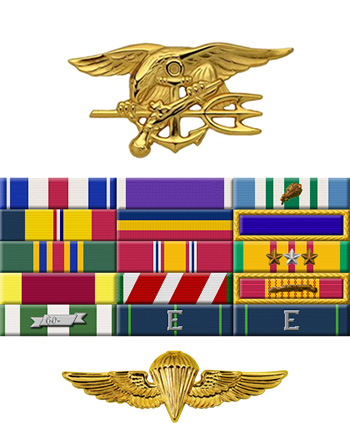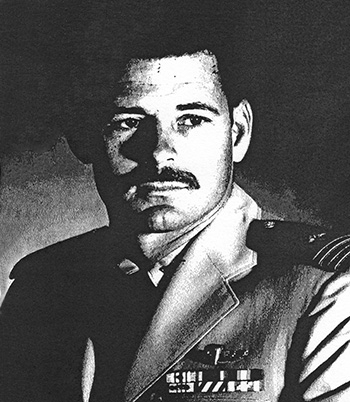Michael Collins was born on October 12, 1942, in Concord, California. He entered the U.S. Naval Academy in May 1960, and was commissioned an Ensign in the U.S. Navy on June 3, 1964. Ensign Collins then remained at the Academy in training for the U.S. Olympic Swimming Team, and served as an instructor in the Academy's Physical Education Department from June to September 1964. He next attended the Combat Information Center Watch Officers course at U.S. Fleet Anti-Air Warfare Training Center San Diego, California, from October to November 1964, followed by service as a CIC Officer aboard the destroyer leader USS John S. McCain (DL-3) from December 1964 to May 1966. LtJg Collins attended Underwater Demolition Team Replacement Accession training with Class 039 at NAB Coronado, California, from May to November 1966, and then served with Underwater Demolition Team ELEVEN (UDT-11) at NAB Coronado from November 1966 to June 1968. His next assignment was with the Studies and Observations Group under the U.S. Military Assistance Command Vietnam from June 1968 to July 1969, followed by service with SEAL Team ONE at NAB Coronado from July 1969 until he was killed in action while deployed to South Vietnam on March 4, 1971. Michael Collins was buried at Fort Rosecrans National Cemetery in San Diego, California.
His Silver Star Citation reads:
For conspicuous gallantry and intrepidity in action during operations against enemy forces in the Republic of Vietnam on 30 January 1971. As leader of a fifteen-man SEAL patrol assigned the mission of capturing the leaders of the Saigon-Cholon foreign proselyting section, Lieutenant Collins successfully led two of his three elements through a heavily booby trapped enemy area before encountering heavy automatic weapons fire from a large enemy force. Remaining calm, he strategically deployed his force to counter the enemy fire, and then ordered his radioman to scramble air support to aid in suppressing the fire of the well-dug-in enemy force. Simultaneously, he called for helicopters to evacuate his casualties. Lieutenant Collins moved about the area to survey the situation and discovered that one of his men had been fatally wounded and two were critically wounded by the initial volley of enemy fire. When the corpsman arrived at the scene, Lieutenant Collins was administering mouth to mouth resuscitation to one of his stricken teammates, following which he returned to the security element and continued to direct a heavy volume of fire toward the enemy. While members of the patrol were boarding the SEAL Support Craft, the Vietnamese interpreter was wounded by enemy fire. Lieutenant Collins, fully exposing himself to the withering fire, dragged the wounded man to a small ditch and administered first aid. He then carried the man to the boat through a continuous rain of fire from the pursuing enemy and directed the boat to get underway to a secure location where he supervised the evacuation of his stricken comrades. By his calm, cool, and decisive actions in the face of withering enemy fire, Lieutenant Collins prevented almost certain disaster for the entire platoon at the hands of a vastly outnumbering force. His inspiring performance of duty was in keeping with the highest traditions of the United States Naval Service.
|



